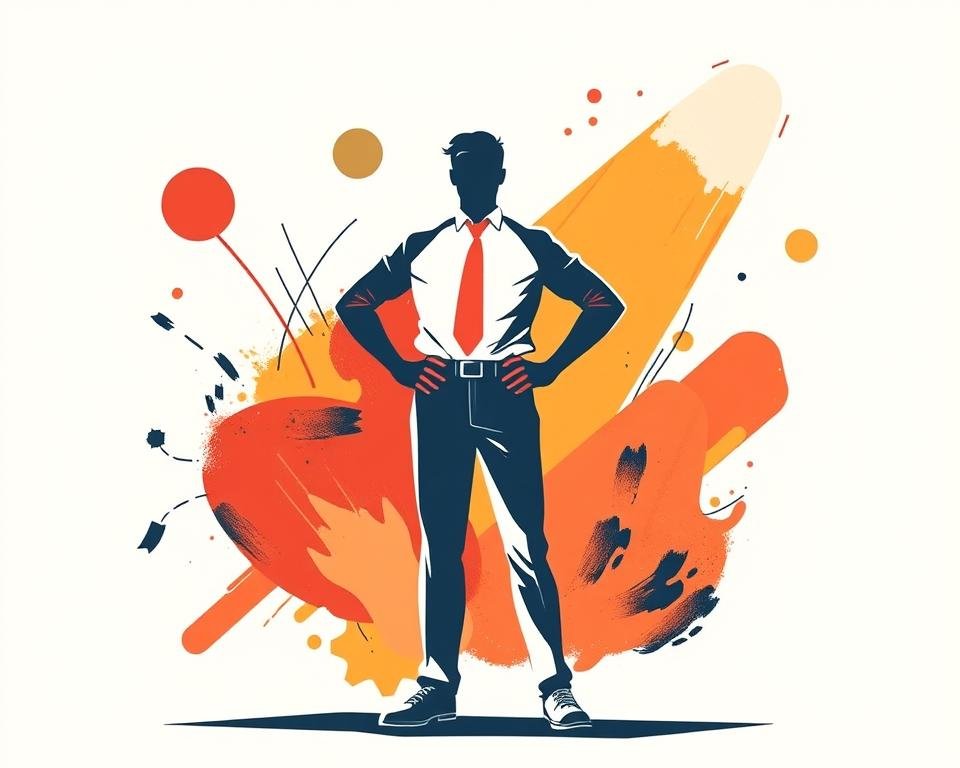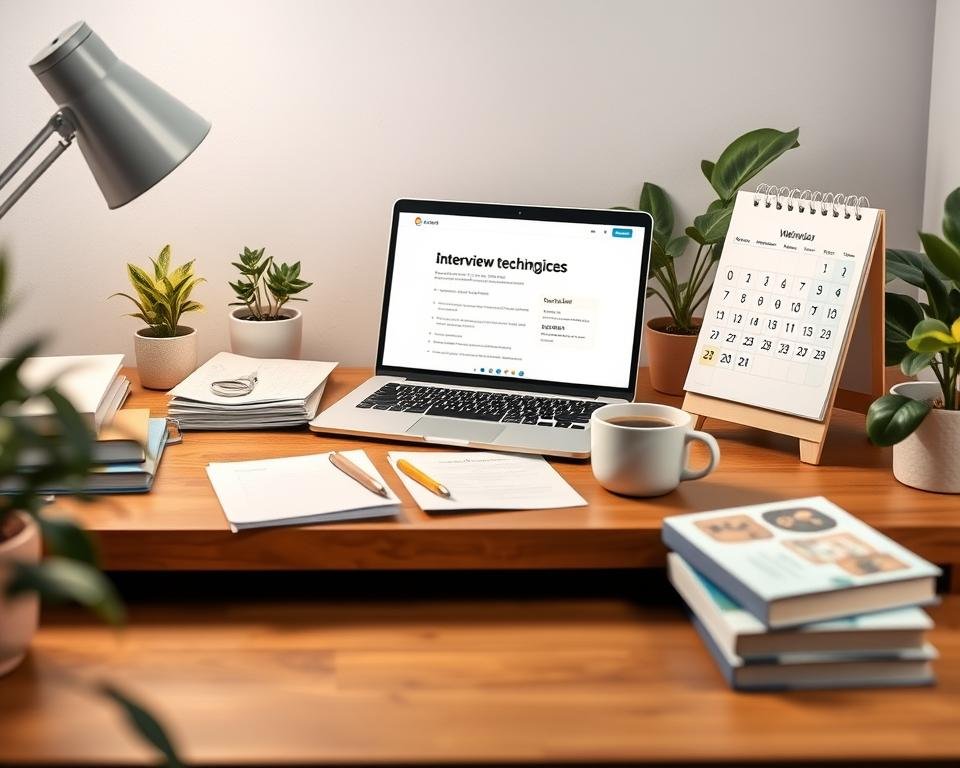Job interviews can be very stressful. But, you can make them less scary by improving your skills. It’s important to think before you answer, speak clearly, and listen well. You also need to practice and understand what the interviewer wants.
Being on time and using the interviewer’s name are key. Also, having good questions ready is important. CEOs like Richard Branson and Brian Scudamore look for people who fit well with their company’s culture.
Employers value skills like problem-solving and leadership a lot. A 2016 survey by Jobvite found that fitting in with the company culture is almost as important as experience.
By improving your interview skills, you can get your dream job. You’ll feel more confident during the job search.
Understanding the Fundamentals of Job Interview Success
Getting ready for a job interview is key. You need to know about the company, the job, and the industry. This shows you understand and fit well. Also, practicing answers to common questions helps you speak about your skills and experiences with confidence.
Key Components of Interview Preparation
- Learn about the company’s history, mission, values, and challenges. This shows you align with their goals.
- Know the job’s needs and what you can do. This helps you show how you’re a good fit.
- Prepare answers to common questions. Use the STAR method to make your answers clear and strong.
Common Challenges Faced by Job Seekers
Many job seekers face nervousness, lack of confidence, and trouble sharing their skills and experiences. Overcoming these with practice and prep can make you seem confident and skilled.
Building a Strong First Impression
First impressions matter a lot in job interviews. Be on time, dress right, make eye contact, and shake hands firmly. Also, bring extra resumes, a pen, and a notepad for notes after the interview. This shows you’re organized and pay attention to details.
“Preparation is the key to success in any job interview. By thoroughly researching the company, role, and industry, you can showcase your fit and confidence.”

Why Lacking Interview Skills in Job Searches Impacts Success
Doing well in job interviews is key to getting your dream job. But, many struggle with poor interview skills. Not being able to share your experiences and skills well can really hurt your chances.
Making common interview mistakes like not preparing enough or not asking good questions can also harm your chances. These mistakes can leave a bad impression on employers.
The job market is tough, with only 20% of applicants getting an interview. Even if you get an interview, the chance of getting the job after a second interview is only 25% to 50%. On average, 250 people apply for one job, with only 4 to 6 getting an interview and just one getting the job.
Networking is a strong way to find new job opportunities. 53% of candidates get jobs through referrals from current employees. And, if the referral is from a Director, the success rate jumps to 91%. Improving your interview skills can really help you stand out.
“The average application to interview ratio is about 20%. The odds of landing a job after a second interview are approximately 25% – 50%. On average, there are 250 applications received for any advertised job, with only 4 – 6 applicants securing an interview, and only one being hired.”
To boost your chances, focus on improving your interview skills. This means getting better at communicating, showing off your qualifications, and making a good impression on employers.
Essential Communication Techniques for Interviews
Effective communication is key to acing job interviews. By learning to listen actively, respond thoughtfully, and show confident body language, you can impress employers. This can help you land the job you want.
Active Listening and Response Strategies
Active listening is vital in an interview. Rephrasing questions and saying “That’s an interesting question” gives you time to think. It shows you understand the interviewer and stay calm.
Body Language and Non-verbal Communication
Non-verbal cues are important in interviews. Keeping eye contact, shaking hands firmly, and standing up straight shows confidence. Studies say good eye contact can make you 75% more relatable.
Maintaining Professional Composure
Stay focused, avoid badmouthing past jobs, and handle personal questions wisely. This shows you can stay calm and professional. Wearing conservative business clothes can make a big difference, with an 80% chance of a good impression.
Learning these communication skills can boost your interview game. Remember, it’s not just what you say, but how you say it that matters.

Mastering Pre-Interview Research and Preparation
Doing thorough pre-interview research and preparation is key to acing any job interview. You should study the company’s culture, recent news, and industry trends. This helps you understand the organization and the role you’re applying for better.
Preparation also means reviewing common interview questions and practicing your answers. It’s good to have examples of your past achievements ready. Asking thoughtful questions about the role and company shows you’re really interested. Knowing about salary ranges and benefits can help in salary talks.
- Understand the company’s values, mission, and recent developments
- Review common interview questions and practice your responses
- Prepare relevant examples and anecdotes to showcase your skills and experiences
- Develop a list of insightful questions to ask the interviewer
- Research the salary range and benefits for the position
“Thorough preparation is the key to a successful job interview. By understanding the company and industry, you’ll be better equipped to demonstrate your fit for the role and leave a lasting impression.”
By researching company culture and preparing well, you boost your confidence. You’ll stand out from other candidates. This increases your chances of getting the job.

Developing a Comprehensive Interview Strategy
Good interview preparation is more than just knowing common questions. It’s about creating a detailed plan. This plan should cover everything from researching the company to practicing your answers.
Developing Effective Response Strategies
Job interviews can be tough, but with the right strategies, you can show off your skills. The STAR method is a great way to answer behavioral questions. It helps you explain the Situation, Task, Actions, and Results clearly.
This method makes your answers detailed and compelling. It shows your problem-solving skills and how you fit the role.
When you’re getting ready for interviews, be ready for tough questions. Anticipate curveball questions and tailor your responses. This shows you’re flexible and can think critically.
Showcasing Your Achievements
When talking about your qualifications, use specific examples. Highlight your achievements clearly and concisely. This helps the interviewer see your value and how you’ll contribute.
“The key to a successful interview is to be prepared, confident, and authentic in your responses. Showcase your strengths and how they align with the company’s needs.”
Good interview strategies mean tailoring your responses to the job and company. Also, focus on skills you can transfer and your eagerness to learn.
Professional Etiquette and Follow-up Protocols
Getting the job is just the start. Showing professional etiquette and following up well can make you stand out. Send a post-interview follow-up within 24 hours, like a thank-you note or email. It shows you’re grateful and really want the job.
It’s also key to stay professional with everyone, not just the interviewer. 93% of interviewers say candidates who know the company well make a good impression. Showing you can communicate well is a big plus.
- Arrive 10-15 minutes early to show you’re on time and respect the interviewer’s time.
- Keep a positive vibe with your body language, like a firm handshake and smile. 55% of employers see this as important.
- Accept a glass of water if offered, as 72% of interviewers see this as a good sign.
- Be polite and proper during a meal interview, as 88% of employers value this.
Good post-interview follow-up and staying professional can really help you get the job. Remember, the interview doesn’t stop when you leave. It’s a continuous effort that needs focus and care.
“Sending a thank-you note after an interview is a common practice, with 95% of recruiters appreciating it. 70% think a handwritten note is more meaningful than an email or voicemail.”
Conclusion
Improving your interview skills is a journey that never ends. It takes preparation, practice, and a commitment to keep learning. By working on communication, research, and how you respond, you can do better in interviews. This can help you get the job you want.
Every interview is a chance to learn and get better for the next one. Stay open to feedback and keep improving your improving interview skills and interview preparation tips. With the right approach, you can confidently find a job that fits your career goals.
Your effort to improve your interview skills shows your dedication and strength. Keep your focus, face challenges head-on, and believe in your hard work. Your progress in your career will show the value of your efforts.